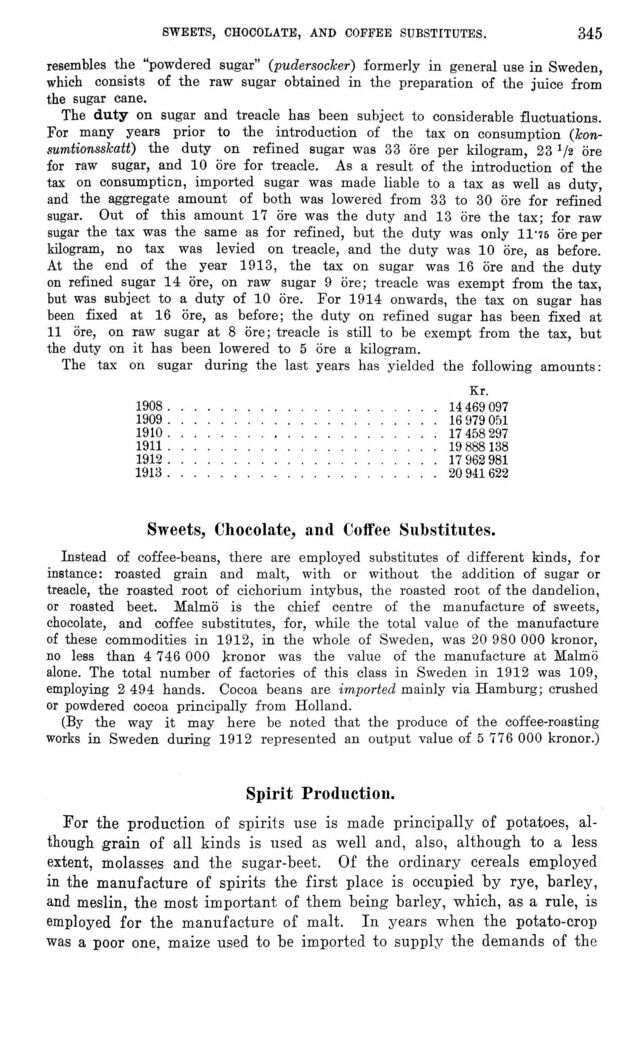
Full resolution (JPEG) - On this page / på denna sida - VII. Manufacturing Industries. Introd. by [G. Sundbärg] K. Åmark - 1. Articles of Food and Consumption. Introd. by Alf. Larson - Sugar Refineries. By Å. G. Ekstrand - Sweets, Chocolate, and Coffee Substitutes. By Å. G. Ekstrand - Spirit Production. By Å. G. Ekstrand

<< prev. page << föreg. sida << >> nästa sida >> next page >>
Below is the raw OCR text
from the above scanned image.
Do you see an error? Proofread the page now!
Här nedan syns maskintolkade texten från faksimilbilden ovan.
Ser du något fel? Korrekturläs sidan nu!
This page has never been proofread. / Denna sida har aldrig korrekturlästs.
sweets, chocolate, and coffee substitutes.
345
resembles the "powdered sugar" (pudersocker) formerly in general use in Sweden,
which consists of the raw sugar obtained in the preparation of the juice from
the sugar cane.
The duty on sugar and treacle has been subject to considerable fluctuations.
For many years prior to the introduction of the tax on consumption
(kon-sumtionsskatt) the duty on refined sugar was 33 ore per kilogram, 23 x/2 ore
for raw sugar, and 10 ore for treacle. As a result of the introduction of the
tax on consumpticn, imported sugar was made liable to a tax as well as duty,
and the aggregate amount of both was lowered from 33 to 30 ore for refined
sugar. Out of this amount 17 ore was the duty and 13 ore the tax; for raw
sugar the tax was the same as for refined, but the duty was only ll-76 ore per
kilogram, no tax was levied on treacle, and the duty was 10 ore, as before.
At the end of the year 1913, the tax on sugar was 16 ore and the duty
on refined sugar 14 ore, on raw sugar 9 ore; treacle was exempt from the tax,
but was subject to a duty of 10 ore. For 1914 onwards, the tax on sugar has
been fixed at 16 ore, as before; the duty on refined sugar has been fixed at
11 ore, on raw sugar at 8 ore; treacle is still to be exempt from the tax, but
the duty on it has been lowered to 5 ore a kilogram.
The tax on sugar during the last years has yielded the following amounts:
Kr.
1908 ..........................................14 469 097
1909 ..........................................16 979 051
1910 ..........................................17 458 297
1911 ..........................................19 888 138
1912 ..........................................17 962 981
1913 ..........................................20 941 622
Sweets, Chocolate, and Coffee Substitutes.
Instead of coffee-beans, there are employed substitutes of different kinds, for
instance: roasted grain and malt, with or without the addition of sugar or
treacle, the roasted root of cichorium intybus, the roasted root of the dandelion,
or roasted beet. Malmö is the chief centre of the manufacture of sweets,
chocolate, and coffee substitutes, for, while the total value of the manufacture
of these commodities in 1912, in the whole of Sweden, was 20 980 000 kronor,
no less than 4 746 000 kronor was the value of the manufacture at Malmö
alone. The total number of factories of this class in Sweden in 1912 was 109,
employing 2 494 hands. Cocoa beans are imported mainly via Hamburg; crushed
or powdered cocoa principally from Holland.
(By the way it may here be noted that the produce of the coffee-roasting
works in Sweden during 1912 represented an output value of 5 776 000 kronor.)
Spirit Production.
Por the production of spirits use is made principally of potatoes,
although grain of all kinds is used as well and, also, although to a less
extent, molasses and the sugar-beet. Of the ordinary cereals employed
in the manufacture of spirits the first place is occupied by rye, barley,
and meslin, the most important of them being barley, which, as a rule, is
employed for the manufacture of malt. In years when the potato-crop
was a poor one, maize used to be imported to supply the demands of the
<< prev. page << föreg. sida << >> nästa sida >> next page >>